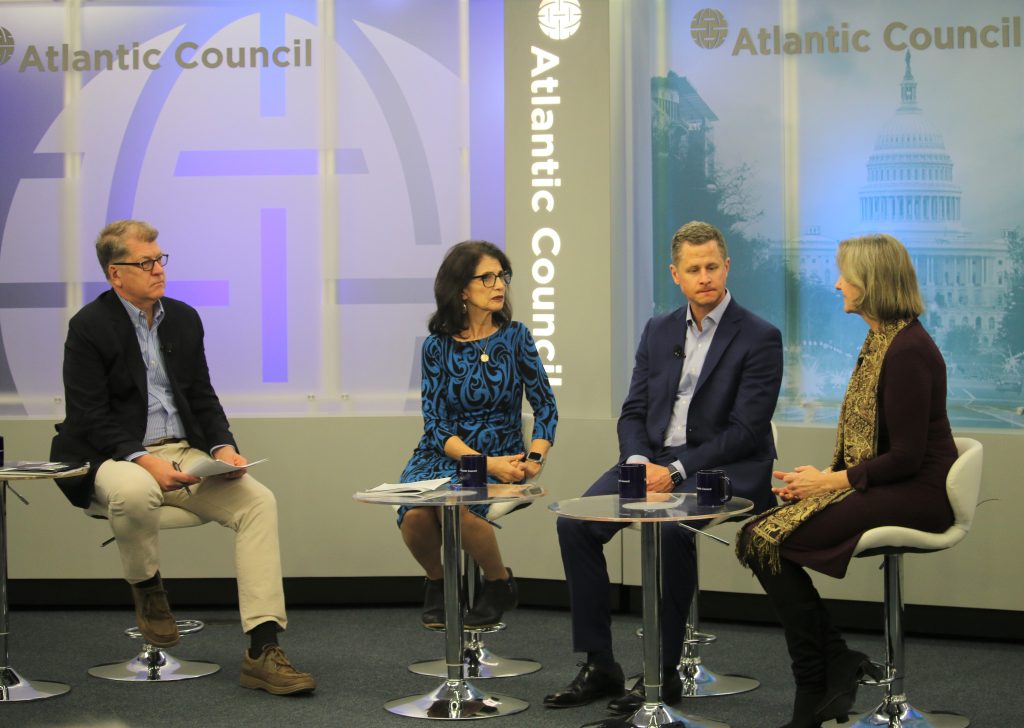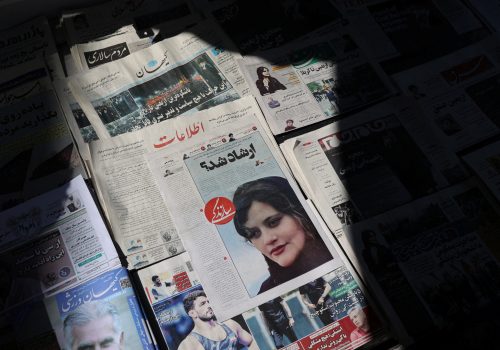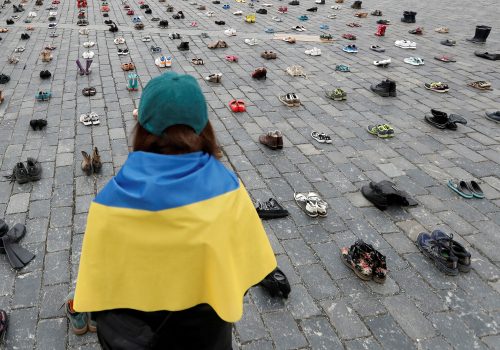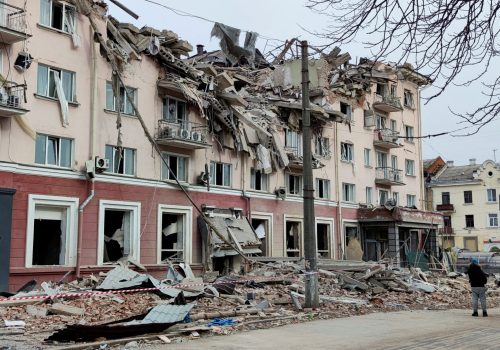On February 15, the Atlantic Council’s Strategic Litigation Project held a discussion about the United States’ approach to cases of wrongful detentions abroad, how strategies can be improved, and ways to better support the families of those detained. Given that US persons are now just as likely to be detained by foreign governments as by terrorist and other transnational criminal organizations, this panel was convened to discuss how best to prioritize prevention and accountability measures. The event featured opening remarks from Strategic Litigation Project Director Gissou Nia, and keynote remarks by Congresswoman Haley Stevens (D-MI) and Congressman French Hill (R-AR).
In his keynote remarks, Congressman Hill briefly discussed his experience with wrongful detention after one of his constituents, Majd Kamalmaz, was detained in Syria. He spoke to the importance of expeditiously recognizing US persons who have been wrongfully detained, the role of the US government to ensure that deterrents are in place and that punishments are effective, and the importance of the coordination between the US legislative and executive branches in working to support American detainees and their families. The Congressman’s concerns were echoed by the remarks of Congresswoman Stevens, who currently serves as Co-Chair of the New American Hostage Task Force. Specifically, she discussed her efforts to free Paul Whelan from his detention in Russia and the importance of coming together in advocacy.
The subsequent panel was moderated by Semafor Founding Editor at Large Steve Clemons and featured notable advocates for past and current detainees. The key points from the discussion are summarized below.
The nature of global hostage-taking has changed, and the US response must evolve accordingly.
Diane Foley—mother of James Foley and founder of the James W. Foley Legacy Foundation—explained that the involvement of state actors in wrongful detentions renders these cases more complex and necessitates that the US government adapts to the new set of challenges it presents. She held that wrongful detention abroad is not a purely human issue; it affects national security and warrants a comprehensive review of the US hostage enterprise.
Foley’s concerns were similarly felt by Elizabeth Whelan—advocate and sister of Paul Whelan, the former US marine who has been detained in Russia—who emphasized the “need for speed” in the US response to these cases. She noted Russia’s attempts over time to “up” the value of her brother to gain more leverage against US efforts toward his release. She proposed that a series of “red flags” should be established to notify the government that there is a possibility of a US person being wrongfully detained by a foreign government so that cases can be identified and escalated more swiftly.
On the point of preventing future detentions, Ryan Fayhee—partner at Hughes Hubbard & Reed LLP and former US Department of Justice national security official—called for the use of existing deterrence methods, claiming that “foreign governments need to know that they will be isolated from the global economy if they take Americans.” He added that while wrongful detentions of US persons have been treated on a case-by-case basis, the use and expansion of deterrence methods would interrupt the rapid acceleration of this practice.
Looking to the future, both Foleyand Whelan mentioned the need for the US government to fully commit to bringing detainees home, citing the feeling that their loved ones were “abandoned” in the early stages of their detention. Foley added that the US government is obligated to ensure that proper safeguards are in place for US persons traveling internationally.
Despite their criticisms, the panelists all acknowledged the progress that has already been made, including the passage of the Robert Levinson Hostage Recovery and Hostage-Taking Accountability Act in 2020, and the establishment of the Hostage Recovery Fusion Cell in 2015.
A solutions-oriented approach is crucial to current and future cases.
Regarding the politicization of wrongful detention cases, Whelan recalled the many negative responses to WNBA player Brittney Griner’s release from Russian detention as a result of a “prisoner swap,” while Paul Whelan remained detained. She disavowed those using her brother’s case for political gain and encouraged collaboration to find a path forward, stressing the need to put “people in front of policy.” To this end, she stressed the importance of bipartisanship, saying that politicizing these cases plays into the hands of captors.
When discussing practical improvements to be made, Foleysuggested further integrating the Hostage Recovery Fusion Cell so that more coordination is encouraged between the entities that compose it and engagement with different branches of government is encouraged. The Cell is currently housed within the Federal Bureau of Investigations (FBI), which coordinates the work of staff within the FBI, the Department of State, the Department of Defense, and the Department of the Treasury.
When asked about the role of legislators, Fayhee emphasized the utility of constructive conversations between advocates and representatives in Congress. He highlighted the number of policymakers who care about this issue and are willing to engage with the executive branch to elevate cases. Foley and Whelan agreed, adding that they are “always looking for champions” for this cause on Capitol Hill.
Efforts should be made to empower detainees and their advocates.
The panelists stressed the need to elevate the profiles of wrongful detention cases so that families and advocates may have strategic conversations with officials and lawmakers. More visibility for individual cases also incentivizes information sharing between the executive branch, lawmakers, and the families of detainees. Foley cited efforts to codify an official National Hostage and Wrongful Detainee flag as an example of pursuits to increase attention to the cause.
In addition to the challenges wrongful detentions pose to international affairs and diplomacy, they also inflict a great humanitarian cost, both to the persons detained and their families and advocates. Foleyand Whelan noted the lack of federal resources to support families advocating for their loved one’s release, with Fayhee adding that “no family should go bankrupt” lobbying for a detainee’s safe return. They suggested that Congress set aside funds to mitigate the costs of traveling to Washington for advocacy. Fayheeand Whelan also highlighted the importance of long-term post-isolation support for former detainees, noting that they are often subject to horrific conditions while in confinement and will likely experience post-traumatic stress upon return.
Britt Gronemeyer is a Young Global Professional with the Middle East Programs at the Atlantic Council.
Alana Mitias is Assistant Director of the Strategic Litigation Project at the Atlantic Council.
Further reading
Wed, Mar 8, 2023
Gender persecution is happening in Iran. Targeted sanctions would be a step toward accountability.
New Atlanticist By Celeste Kmiotek, Lisandra Novo
Designating the Supreme Council of the Cultural Revolution, a principal institution behind the systematic oppression of women in Iran, would put its members on notice.
Fri, Feb 24, 2023
How legal actions against Russian aggression in Ukraine can serve as a model for other conflicts
New Atlanticist By Celeste Kmiotek, Lisandra Novo
There is an unprecedented number of investigations and accountability efforts under way in response to Russia's invasion. It's a sign of success—but it also shows how victims of international crimes have unequal access to justice.
Wed, Mar 16, 2022
Punish Putin for past and present crimes
New Atlanticist By Gissou Nia, Jomana Qaddour
Justice will remain incomplete if the dots aren't connected among Putin’s crimes in Chechnya, Syria, and Ukraine.



